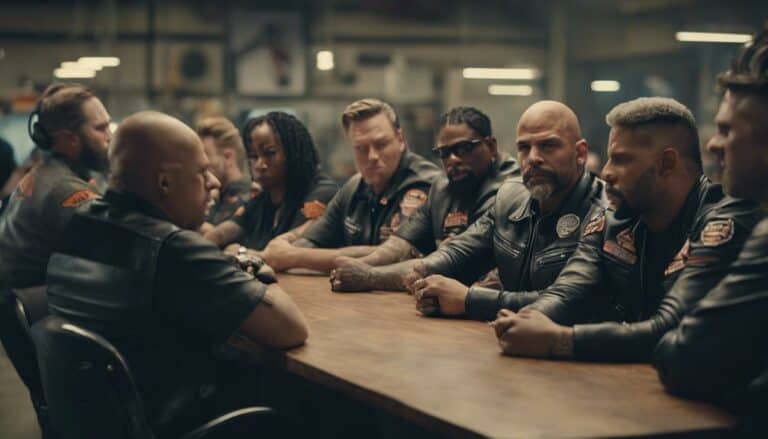Imagine peeking behind the curtain to discover a kaleidoscope of opinions within the Harley Davidson workforce regarding Trump's actions. As you explore the intricate web of feelings and thoughts among the employees, you'll uncover a complex tapestry of support, criticism, and uncertainty.
The diverse perspectives and emotions swirling around this topic provide a fascinating insight into the intersection of politics and industry, leaving you eager to explore the nuances of each individual's stance.
Key Takeaways
- Employees expressed a mix of support and concerns towards Trump's policies.
- Loyalty to Trump was evident despite worries about potential job losses.
- Workers appreciated Trump's efforts in reviving US industries.
- Many attributed production shifts more to the EU than to Trump.
Historical Context of Harley-Davidson and Trump
In the historical context of Harley-Davidson and Trump, the relationship between the iconic motorcycle company and the former president has been marked by both support and controversy. Trump's imposition of tariffs on steel and aluminum imports played a significant role in Harley-Davidson's decision to move some production overseas.
Despite this, many American workers at Harley-Davidson expressed support for Trump, believing his trade practices were strategic in negotiating better deals for the country and protecting American industries. Workers appreciated Trump's efforts to revive the U.S. steel and aluminum industry, viewing him as a defender of American manufacturing.
While concerns arose about potential job losses due to Harley-Davidson's overseas production shift, workers in Wisconsin, a pivotal swing state, continued to show loyalty to Trump, emphasizing his impact on blue-collar workers. The workers largely attributed the company's decision to move production abroad to the EU's retaliatory tariffs, rather than solely blaming Trump for the shift.
Employee Reactions to Trump's Policies
Amidst the ongoing discussions surrounding Harley-Davidson employees' perspectives on Trump's trade policies, their reactions reflect a mix of support and concerns regarding the impact on their jobs and the company's decisions.
Some workers express backing for Trump's trade policies, believing he's strategically negotiating deals despite potential job losses. Workers tend to attribute Harley-Davidson's decision to move production overseas more to the EU than to Trump. Employees appreciate Trump's initiatives to revive the U.S. steel and aluminum industry. Despite worries about job losses, workers maintain loyalty to Trump due to his emphasis on American manufacturing.
Impact on Company Morale and Loyalty
The impact of President Trump's trade policies on Harley-Davidson employees' morale and loyalty remains a topic of significant discussion within the company. Many employees express continued support for Trump, viewing his actions as part of a strategic approach to negotiating trade deals. Despite the decision to move production overseas, most workers blame the EU rather than Trump. They appreciate his efforts to revive the US steel and aluminum industry and maintain loyalty to him for his stance on American manufacturing. While there are concerns about potential job losses, employees seem to stand by Trump, valuing his commitment to domestic manufacturing.
| Positive Aspects | Concerns |
|---|---|
| – Strategic approach in trade deals | – Potential job losses |
| – Reviving US steel and aluminum industry | – Production moving overseas |
| – Loyalty to Trump for supporting American manufacturing | – Blaming the EU for decisions |
Public Statements and Actions by Employees
Despite the concerns surrounding potential job losses and the decision to move production overseas, Harley-Davidson workers have been vocal in their public statements and actions regarding President Trump's trade policies.
- Many employees expressed continued support for President Trump despite fears of job losses, indicating a complex relationship between workers and the administration.
- Some workers view Trump's trade negotiations as strategic and essential for the revitalization of American industries, showing a belief in the long-term benefits of his policies.
- Most employees assign blame to the EU rather than Trump for the company's choice to relocate production overseas, illustrating a nuanced understanding of the factors at play in the decision-making process.
Future Outlook for Harley-Davidson Under Trump
Looking ahead, the future outlook for Harley-Davidson under President Trump remains a topic of keen interest among both employees and industry analysts. Despite concerns about potential job losses, many Trump supporters within the company believe that his actions in the ongoing trade disputes are part of a strategic negotiation to secure better deals for the United States.
While some employees express worry about the impacts of moving production overseas due to the European Union's retaliatory tariffs, most workers attribute this decision to the EU rather than to Trump himself. Workers at the Wisconsin factory appreciate Trump's efforts to revive the American steel industry, which has contributed to their loyalty towards him. Despite the potential job impacts, a significant portion of employees in Wisconsin continue to show support for Trump and his trade policies.
The future of Harley-Davidson under Trump's administration remains uncertain, with ongoing trade tensions and shifting production strategies shaping the company's trajectory.
Conclusion
In conclusion, it seems that many Harley-Davidson employees have remained steadfast in their support for President Trump, despite the company's decision to move production overseas. Their loyalty to Trump's trade policies and efforts to save the US steel industry has overshadowed any concerns about potential job losses.
It's a curious irony that a company known for its American-made products is now facing backlash for seeking alternatives abroad.

